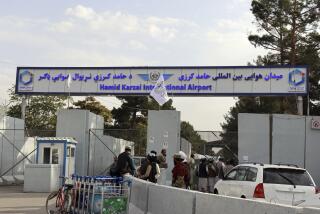Pilgrims Again Get Blame for Official’s Death
- Share via
KABUL, Afghanistan — After a third official attempt to explain the death last week of Afghanistan’s aviation minister, the circumstances of the killing were left murkier than ever Wednesday.
The country’s foreign minister contradicted the prime minister by telling reporters that the Feb. 14 airport slaying of Abdul Rahman was not premeditated but rather a spontaneous act sparked by the anger of Muslim pilgrims whose flights had been delayed.
Foreign Minister Abdullah said three of the senior government security officials accused in the killing were among the pilgrims traveling to Mecca. He said they “might have provoked feelings” among hundreds of the pilgrims, or hajjis, enraged after waiting more than two days for flights to the Saudi holy city.
“A premeditated plan suggests a totally different situation. It does not account for the anger of the hajjis” toward Rahman, Abdullah said.
Immediately after the slaying of Rahman, who was air transportation and tourism minister, blame fell on the pilgrims, who had been waiting for their flights in subfreezing temperatures on the darkened airport tarmac and inside an unlighted, unheated terminal. Three pilgrims had died of exposure the night before, Abdullah said.
But in the government’s first official explanation, given the day after the slaying, interim Afghan Prime Minister Hamid Karzai blamed a conspiracy. Two days later, he said the killing had no political overtones and was strictly a personal vendetta.
On Wednesday, Abdullah returned to the pilgrims theory, saying the killers were part of a mob that confronted Rahman at the airport, where he was leaving on a business trip. The pilgrims accused Rahman of taking over a plane meant for them, government officials have said.
Asked Wednesday whom reporters should believe, the prime minister or the foreign minister, Abdullah smiled and replied, “Both of us.”
Abdullah said no one in the Cabinet or government believes that the killing was premeditated or politically motivated. There was no comment Wednesday from Karzai, but one Cabinet minister told Associated Press that he believes the prime minister’s version. That suggested a lack of unanimity within the government, if not an outright split.
The slaying has caught the interim government flat-footed, both because of security lapses that allowed the killers to strike and then flee to Saudi Arabia and because of the conflicting official accounts.
This week, the government announced that, in addition to the police investigation, a probe was being launched by two Cabinet members.
Rahman’s death has prompted reports of a rogue faction within the government’s security apparatus, led by Panjshir Valley ethnic Tajiks from the Northern Alliance who wield power at the expense of majority Pushtuns. The three top security officials charged are so-called Panjshiris, as are most of the senior police officials investigating the crime.
Rahman had quit the Jamiat-i-Islami party, dominated by Panjshiris, several years ago and shifted his allegiance to supporters of Afghanistan’s deposed king, Mohammad Zaher Shah. When Karzai linked the slaying to a long-standing feud, he appeared to be referring to Rahman’s falling-out with the party.
Abdullah was the longtime spokesman for Jamiat-i-Islami. Karzai, a Pushtun, is not a party member.
Abdullah said Rahman was attacked on the plane and then thrown to the tarmac, where he was beaten by a mob of pilgrims. Autopsy results have not been released, but Rahman’s relatives have said he was stabbed.
Abdullah said he could not confirm that any of the three suspects had been arrested in Saudi Arabia, contradicting Karzai, who told reporters Sunday that two of the men had been captured and were being returned to Afghanistan.
Authorities have named the three as Gen. Abdullah Jan Tawhidi, the deputy intelligence chief; Gen. Kalandar Beg, a deputy defense minister; and Abdul Haleem, a deputy justice minister. Karzai has flatly accused them of killing Rahman, saying, “They have committed a murder.”
Three other top security officials have been arrested in Kabul, according to authorities. It is not clear whether they are suspected of taking part in the slaying or of involvement in security lapses.
Abdullah said the killing highlighted “shortcomings and deficits for which all of us in government are responsible.”
More to Read
Sign up for Essential California
The most important California stories and recommendations in your inbox every morning.
You may occasionally receive promotional content from the Los Angeles Times.














